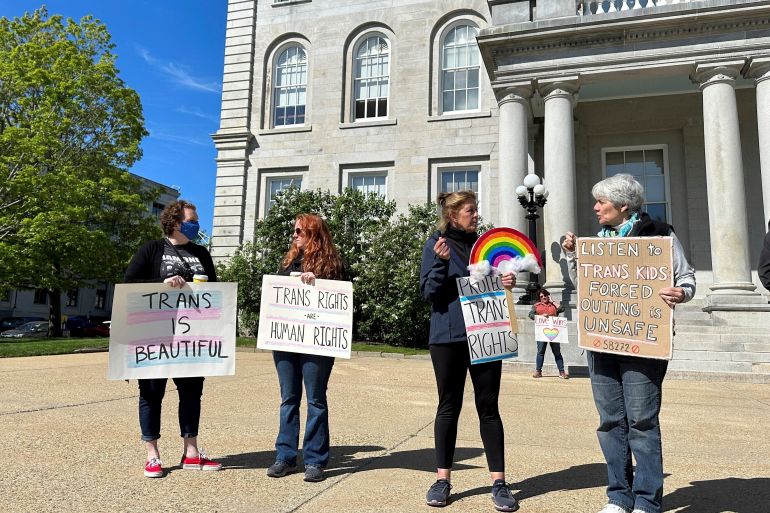Republicans push surge of laws targeting transgender people in US
Laws restricting transgender rights have piled up in recent months, underscoring likely 2024 election battle lines.

A rush of legislation targeting transgender people has been introduced – and in some cases passed – in state legislatures across the United States as the topic has become a Republican priority.
The issue is sure to factor heavily into the 2024 elections as Republicans seek to portray Democrats as out of touch with the values of large swathes of the country and to fend off challenges from further-right candidates within their own party.
Keep reading
list of 3 itemsMissouri carries out first US execution of a transgender person
World Athletics bans transgender women from female events
Most recently, Florida Governor Ron DeSantis, who is expected to announce his bid to be the Republican presidential nominee, signed bills that ban gender-affirming care for minors, restrict chosen pronoun use in schools and force people to use the bathroom corresponding with their sex assigned at birth.
In a statement following the signing, Human Rights Campaign President Kelley Robinson said the measures are “denying transgender children and adults access to life-saving, best-practice medical care [and] contradicting guidelines recommended by every major medical association – representing over 1.3 million doctors in the United States”.
Every major US medical group, including the American Medical Association, has opposed the bans and supported the medical care for youth when administered appropriately. Advocates have long warned the restrictions further marginalise transgender youth and threaten their health.
Recent legislation has gone even farther than that signed by DeSantis. A law signed by Oklahoma’s governor at the beginning of the month made it a felony to provide gender-affirming medical care to minors.
All told, 17 states have recently passed restrictions on such care – which includes things like puberty blockers and hormone therapy for transgender youths. They are Alabama, Arkansas, Arizona, Florida, Georgia, Idaho, Indiana, Iowa, Kentucky, Mississippi, Montana, North Dakota, Oklahoma, Tennessee, Utah, South Dakota and West Virginia.
Only three states had passed such restrictions prior to 2023.
It’s part of a wider trend, according to the Human Rights Campaign. It said there have been more than 500 bills introduced by Republicans affecting LGBTQ people in 2023. At least 48 have passed.
Those numbers are up from 315 bills introduced and 29 passed in 2022.
Like the laws signed by DeSantis, many of these bills target every aspect of a transgender person’s life. Indiana has enacted a law requiring teachers to tell parents when students ask to be called by a new name or different pronoun. North Dakota has approved a law that lets public-school teachers and state employees ignore using a transgender person’s preferred pronouns.
Others seek to ban transgender girls from participating in girls sports, require transgender people to use the bathroom corresponding to their gender assigned at birth or prevent transgender people from changing their sex on identity documents.
More restrictions are expected soon with bills banning gender-affirming care for minors recently reaching the desk of Republican governors in Missouri and Texas and the Nebraska legislature expected to pass a bill on Friday.
Rights groups have responded with a raft of lawsuits. On Thursday, Oklahoma’s governor agreed to not enforce his state’s ban while opponents of the law seek a preliminary injunction against it in federal court. Federal judges have also blocked enforcement of laws in Alabama and Arkansas.
President Joe Biden’s administration has also weighed in. Last month, the Department of Justice sued Tennessee to challenge its Republican-backed ban on gender-affirming care for minors, one of several states where it has filed a complaint or supported lawsuits.
A group of Florida parents has sued in federal court to try to stop rules put in place by the state’s Boards of Medicine and Osteopathic Medicine that have largely prohibited providing gender-affirming care to minors.
They added the latest law signed by DeSantis to their challenge, writing in an emergency appeal that the restriction deprives parents of the “fundamental right to make medical decisions for their children” while causing transgender youth to “suffer a cascade of mental and physical injuries”.